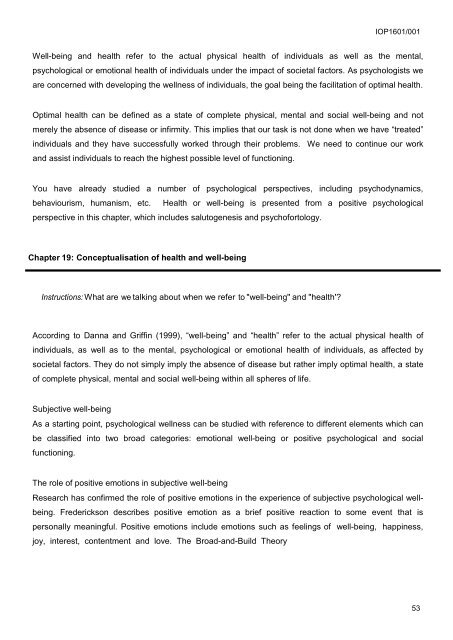IOP1601_MO001_3_2016_E
Create successful ePaper yourself
Turn your PDF publications into a flip-book with our unique Google optimized e-Paper software.
<strong>IOP1601</strong>/001<br />
Well-being and health refer to the actual physical health of individuals as well as the mental,<br />
psychological or emotional health of individuals under the impact of societal factors. As psychologists we<br />
are concerned with developing the wellness of individuals, the goal being the facilitation of optimal health.<br />
Optimal health can be defined as a state of complete physical, mental and social well-being and not<br />
merely the absence of disease or infirmity. This implies that our task is not done when we have “treated”<br />
individuals and they have successfully worked through their problems. We need to continue our work<br />
and assist individuals to reach the highest possible level of functioning.<br />
You have already studied a number of psychological perspectives, including psychodynamics,<br />
behaviourism, humanism, etc. Health or well-being is presented from a positive psychological<br />
perspective in this chapter, which includes salutogenesis and psychofortology.<br />
Chapter 19: Conceptualisation of health and well-being<br />
Instructions: What are we talking about when we refer to "well-being" and "health'?<br />
According to Danna and Griffin (1999), “well-being” and “health” refer to the actual physical health of<br />
individuals, as well as to the mental, psychological or emotional health of individuals, as affected by<br />
societal factors. They do not simply imply the absence of disease but rather imply optimal health, a state<br />
of complete physical, mental and social well-being within all spheres of life.<br />
Subjective well-being<br />
As a starting point, psychological wellness can be studied with reference to different elements which can<br />
be classified into two broad categories: emotional well-being or positive psychological and social<br />
functioning.<br />
The role of positive emotions in subjective well-being<br />
Research has confirmed the role of positive emotions in the experience of subjective psychological wellbeing.<br />
Frederickson describes positive emotion as a brief positive reaction to some event that is<br />
personally meaningful. Positive emotions include emotions such as feelings of well-being, happiness,<br />
joy, interest, contentment and love. The Broad-and-Build Theory<br />
53


